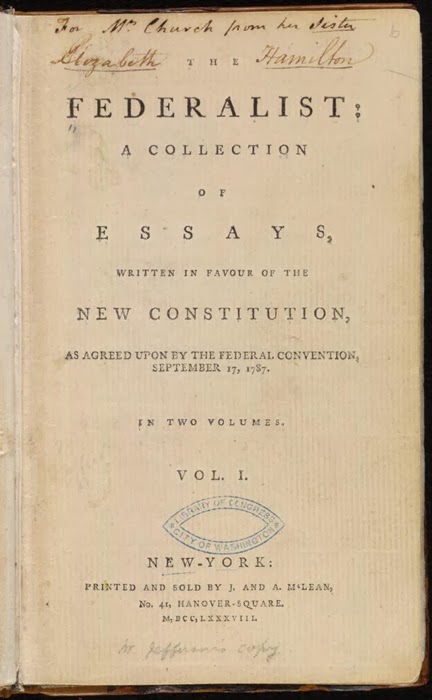A rowdy debate consumed nearly everyone in the United States
between the Constitutional Convention and ratification. The population of the
country was about four million and possibly a quarter of that
number were activists during the Revolution and founding. What did people think
about a constitution written in secret? We don’t have to guess. A prodigious number of
articles and pamphlets were published by proponents and opponents.
The most popular opinion pieces of the period are called the
Federalist
Papers, but these newspaper articles represented only a sampling of proponent
editorials. Many of the delegates to the convention returned to their home
states to write articles supporting the Constitution, as did many who did not
attend. None had the intellectual prowess of the Federalist Papers by James
Madison, Alexander Hamilton, and John Jay, but all reflected the thinking of
proponents of ratification. Opposition pieces
from the thirteen states have been collected in an anthology called
the Antifederalist
Papers. The antifederalists show us what many people feared was wrong about the Constitution. In the short run, the
antifederalists were too pessimistic, but in the long run they were more
accurate in their criticisms.
Sermons are another source for investigating popular
opinion of the day. An excellent reference book would be Political
Sermons of the American Founding Era, 1730-1805.
Lastly, the ratification conventions in each state pitted both
sides against each other in heated face-to-face debates. Ratification:
The People Debate the Constitution, 1787-1788 by Pauline Maier is an exemplary
narrative of these conventions of the people.
To study all of this documentation would take years. Those
with less time might consider The
Essential Federalist and Anti-Federalist Papers.
Another great archive of information about the period is the
essays on the Federalist
Papers at Constituting America. At this site, you can also find essays on
each clause of the Constitution. (My essays
can be found here.)
Our nation’s founders left a prodigious amount of material.
We do not need to guess original intent; it is all laid out in black and
white. We not only know what the enthusiasts thought, we possess a vast trove
of information from those who opposed the Constitution. The Constitution did
not descend from Mount Sinai, it was debated and argued over by an entire
nation until a strong consensus emerged to ratify it as the supreme law of the land.
This was the real American exceptionalism—A nation founded by the people though arduous, but civil debate.
The American Constitution is the crowning achievement of the Age of Reason.



No comments:
Post a Comment